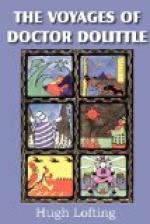The beans’ effect upon Bumpo was most extraordinary. First he broke into a broad smile; then he began to giggle; finally he burst into such prolonged roars of hearty laughter that we had to carry him into the next room and put him to bed. The Doctor said afterwards that he probably would have died laughing if he had not had such a strong constitution. All through the night he gurgled happily in his sleep. And even when we woke him up the next morning he rolled out of bed still chuckling.
Returning to the Reception Room, we were shown some red roots which Long Arrow told us had the property, when made into a soup with sugar and salt, of causing people to dance with extraordinary speed and endurance. He asked us to try them; but we refused, thanking him. After Bumpo’s exhibition we were a little afraid of any more experiments for the present.
There was no end to the curious and useful things that Long Arrow had collected: an oil from a vine which would make hair grow in one night; an orange as big as a pumpkin which he had raised in his own mountain-garden in Peru; a black honey (he had brought the bees that made it too and the seeds of the flowers they fed on) which would put you to sleep, just with a teaspoonful, and make you wake up fresh in the morning; a nut that made the voice beautiful for singing; a water-weed that stopped cuts from bleeding; a moss that cured snake-bite; a lichen that prevented sea-sickness.
The Doctor of course was tremendously interested. Well into the early hours of the morning he was busy going over the articles on the table one by one, listing their names and writing their properties and descriptions into a note-book as Long Arrow dictated.
“There are things here, Stubbins,” he said as he ended, “which in the hands of skilled druggists will make a vast difference to the medicine and chemistry of the world. I suspect that this sleeping-honey by itself will take the place of half the bad drugs we have had to use so far. Long Arrow has discovered a pharmacopaeia of his own. Miranda was right: he is a great naturalist. His name deserves to be placed beside Linnaeus. Some day I must get all these things to England—But when,” he added sadly—“Yes, that’s the problem: when?”
THE FOURTH CHAPTER
THE SEA-SERPENT
For a long time after that Cabinet Meeting of which I have just told you we did not ask the Doctor anything further about going home. Life in Spidermonkey Island went forward, month in month out, busily and pleasantly. The Winter, with Christmas celebrations, came and went, and Summer was with us once again before we knew it.
As time passed the Doctor became more and more taken up with the care of his big family; and the hours he could spare for his natural history work grew fewer and fewer. I knew that he often still thought of his house and garden in Puddleby and of his old plans and ambitions; because once in a while we would notice his face grow thoughtful and a little sad, when something reminded him of England or his old life. But he never spoke of these things. And I truly believe he would have spent the remainder of his days on Spidermonkey Island if it hadn’t been for an accident— and for Polynesia.




